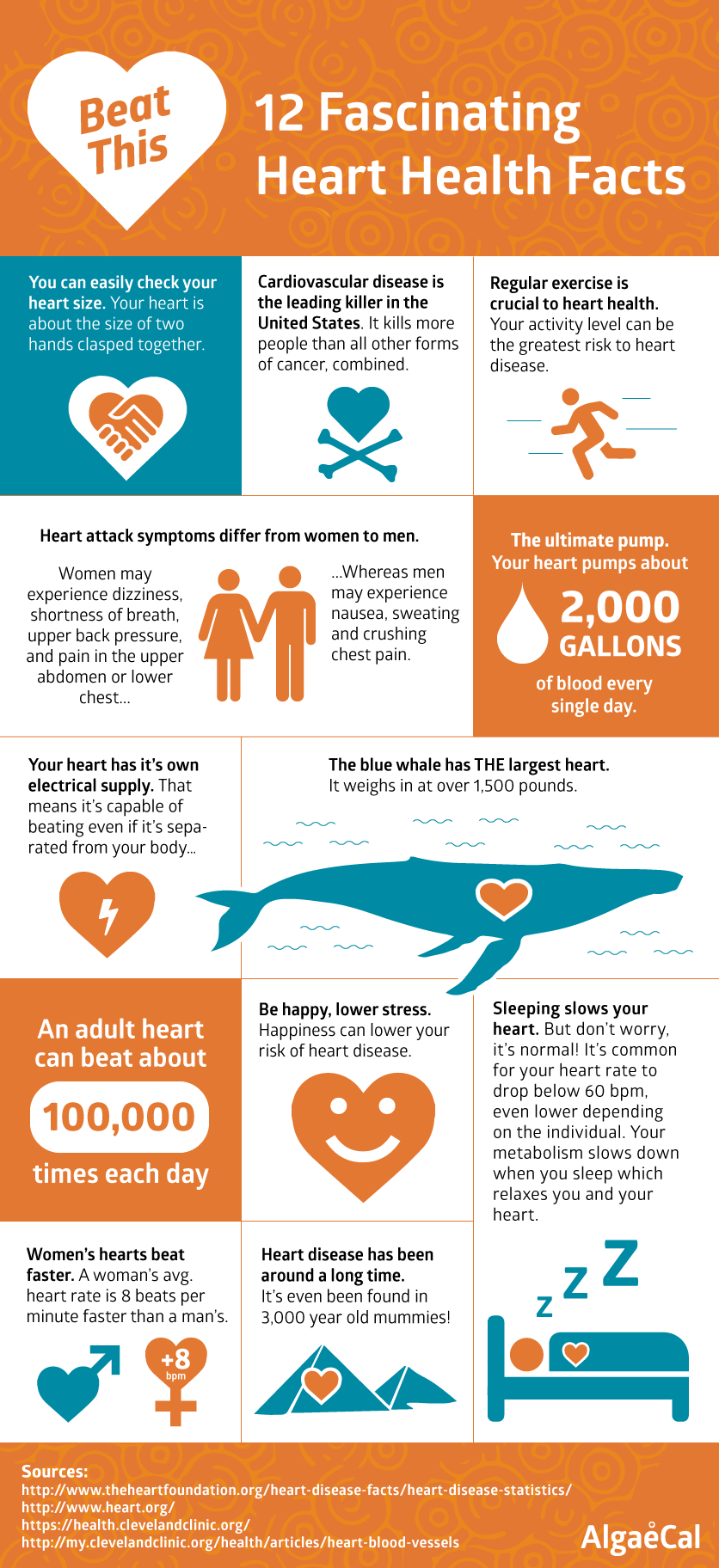How healthy is your heart?
In honor of heart health awareness month we’re sharing how you can protect your heart through exercise, diet and supplementation.
But before we get to that, let’s understand the heart a bit better.
Beat This! 12 Fascinating Heart Health Facts
I get it, statistics can be boring. But the ones I’ve dug up are not!
Stick with me while I share the following heart health facts about this incredible organ:
 [embed_infographic title=”12 Heart Health Facts” alt=”12 Heart Health Facts Infographic” src=”https://blog.algaecal.com/wp-content/uploads/heart-health-infographic-white_logo.gif”]
[embed_infographic title=”12 Heart Health Facts” alt=”12 Heart Health Facts Infographic” src=”https://blog.algaecal.com/wp-content/uploads/heart-health-infographic-white_logo.gif”]
Women’s Heart Health
Cardiovascular disease continues to be the leading cause of death in women in the United States.
While there are similarities between women’s heart health and men’s heart health, we must also recognize the gender differences.
Did you know, estrogen can provide a protective effect on women’s heart health?
But when a woman enters menopause, overall heart disease risk may increase due to the reduction in progesterone and estrogen hormones.
Before and after menopause, women may experience the following:
- Higher cholesterol: After menopause, women tend to have higher cholesterol levels. Natural estrogen levels keep your cholesterol levels in check.
- Higher triglycerides: Research has shown a long-standing association between triglycerides and cardiovascular disease.
- Low bone density: While not directly tied to women’s heart health, a lack of estrogen levels can lead to accelerated bone density loss. Low bone density and a higher risk of fracture can become debilitating and cause a less robust and active lifestyle. An active lifestyle increases overall health, well-being and lowers cardiovascular risk.
Knowing this, how hard is it to diagnose heart health in women?
It’s proven to be quite challenging, especially in younger women. Plus, it’s been acknowledged that there are gender differences in diagnosing acute coronary syndrome (ACS).
One major difference is that heart attack symptoms present themselves differently in men vs. women. Research published in the journal Circulation showed that the symptoms of a heart attack in women can be quite unlike that of men. For instance, the most frequently reported symptoms did not include chest pain, which is a typical symptom in men.
Instead, symptoms of heart attack in women include:
- Anxiety
- Shortness of breath
- Upper back, throat or shoulder pain
- Unusual fatigue (which can last for several days)
- Sleep disturbance
- Feeling lightheaded
- Gas-like pain or indigestion
- Pressure/pain in the center of the chest, which may spread to the arm
For women over 50, there are additional symptoms:
- Sweating
- Irregular or rapid heartbeat
- Severe chest pain
- Discomfort in one or both arms, jaw, stomach, back or neck
This study also reported that nearly 80 percent of participants experienced at least one of these symptoms more than a month before their heart attack!
Unfortunately, the stats show that women who experience a heart attack are less likely to survive than men. This stresses the importance of women’s heart health even more. Especially after you go through menopause.
One way to reduce your risk is through food (what you do and don’t eat). So let’s discuss what you should be eating.

The Best Diet for Heart Health
What you eat can positively or negatively affect your heart health. When thinking of heart-healthy foods, incorporate the following:
- Think Red: Pomegranates, strawberries, red apples, red wine, and beets. Beets are a source of betaine, which is a nutrient that protects your enzymes and cells from environmental damage. In addition, it’s also known to fight inflammation, protect internal organs and improve vascular risk factors.
Bonus: Check out Bone Health Expert, Lara Pizzorno’s Apple and Beet Salad recipe. Each ingredient has exceptional cardiovascular benefits and tastes great!
- Turmeric curcumin: A study published in the Nutrition Research journal has revealed that the primary polyphenol in turmeric, which is called curcumin, is as effective in improving vascular function (how well your vascular system carries blood throughout the body) in postmenopausal women, as moderate aerobic exercise training! Turmeric curcumin supports bone health, joint health, and eye health. It also happens to be oil soluble, meaning turmeric curcumin absorption increases when taken with an oil.
- Ginger: This common Asian cooking spice does more than just give your recipes a nice kick, it also supports circulation. But that’s not all, preliminary studies cited by the University of Maryland Centre suggest ginger can prevent blood clotting. This is good news for those with heart disease, where blood vessels and arteries can clog and lead to heart attack.
- Plant Based Omega 3’s: Flax Seeds, walnuts, chia and hemp seeds are all good examples of plant-based omega-3s for heart health. They are in the form of alpha-linolenic acids, or ALA. These plant-based ALA sources may reduce cardiovascular risk through a variety of mechanisms such as platelet function, inflammation and arterial compliance.
- Animal Sourced Omega 3’s: There is considerable evidence that the omega 3 fatty acids EPA and DHA from seafood reduce the risk of coronary heart disease. The top sources include cold-water, fatty fish such as wild salmon, mackerel, sardines, anchovies and herring.
If you aren’t a fan of consuming large quantities of fish from your diet, fish oil supplementation is an option. We’ll get into that and the best way to go about it shortly, but first, let’s dig into the research a little bit more…
Omega 3s and Heart Health
From the list above, omega 3s and heart health stand out. At least they do to me!
To emphasize the importance of this heart-healthy addition, I’ll reference the most up-to-date and credible science we have today.
You’re probably wondering how much of an effect omega 3s can have on your heart health.
Well, a significant amount it turns out.
In fact, new research shows that people who consume higher concentrations of seafood and plant-based omega 3s are less likely to die from a heart attack.
How much less? Let’s take a look…
The epidemiological study published in the JAMA Internal Medicine, pooled 19 studies into a meta-analysis (across 16 different countries!) totaling 45,637 participants.
Of the participants, there were:
- 7,973 people who developed a heart attack over time
- 7,157 people who had nonfatal heart attacks
- 2,781 deaths
The researchers measured the omega-3 fatty acids tissue or blood levels of the participants.
Here’s what they found:
- Overall, seafood and plant-based omega 3s were associated with a 10% lower risk of fatal heart attacks.
- Participants with the highest blood omega 3 levels had about a 25% lower risk of fatal heart attack. (Compared to participants with the lowest blood omega 3 levels. )
Considering heart disease is the leading cause of death in the world, a 25% lowered risk is extremely significant.
Interestingly enough, the fatty acid biomarkers were generally not associated with a risk of nonfatal heart attacks. (In medicine, a biomarker is used as a measurable indicator of the presence or severity of a disease.) This suggests that there may be a more specific mechanism for the benefits of omega 3s related to death.
Researchers have said that this study is the most comprehensive study to date of how omega 3s influence heart disease.
So how do you get enough of these omega 3 fatty acids?
Most people turn to omega 3 supplements. More on that and how to get them below…

Fish Oil For Heart Health
Fish is the top food source of omega 3 fatty acids, including eicosapentaenoic acid (EPA) and docosahexaenoic acid (DHA).
Cold-water, fatty fish such as salmon, sardines, anchovies, trout and mackerel contain the highest amounts of omega 3 fatty acids, according to the U.S. Department of Agriculture’s National Nutrient Database.
Not only do these fish provide omega 3 fatty acids, but also proteins, selenium, vitamin D and other vitamins and minerals.
The slight problem?
Most people aren’t getting enough. Or simply don’t like eating enough. Hence, the emergence of the multi-billion dollar fish oil supplement market today. In fact, fish oil supplementation was found to be the most popular natural product for adults in The National Health Interview Survey (NHIS).
That’s because fish oil has been extensively researched to positively benefit an array of conditions such as depression, rheumatoid arthritis, dementia and bone loss to name a few. Plus you now know the importance of fish oil for heart health!
Unfortunately, not all fish oils are created equal.
To get all the health benefits, including fish oil for cardiovascular disease, you need to get clinical doses of the omega-3 fatty acids EPA and DHA – which most fish oils don’t provide.
But how do you know how much omega 3s you need to be getting to lower your risk?
How to Test Your Heart Health
Those who are at increased risk for heart disease should get their hearts tested. Specifically, people with risk factors such as: high cholesterol; family history; who smoke (or smoked); or have diabetes and high blood pressure.
Now in the past, stress tests were the norm– the “gold-standard” you may say. But not anymore. Doctors now have more sophisticated tests and tools to determine your heart health, which will give you a much more accurate assessment of your heart attack risk.
They are:
- Stress Echocardiography: This test is an improvement over the standardized stress test because an ultrasound is used before and after exercise. It evaluates your blood flow to the heart’s pumping chambers and checks for blockages in your arteries that supply your heart. Adding the echocardiograph (ultrasound) raises the accuracy by as much as 85% for women.
- High-Sensitivity C-Reactive Protein Test: This blood test measure your CRP, a protein in your blood that indicates inflammation in your body. So if your arteries are inflamed, you have a greater risk of heart disease, stroke, and heart attack. In particular, women with high CRP levels may be up to 4 times more likely to suffer from a stroke or heart attack. If your score is under 1.0 mg per liter your risk is low for developing heart disease. Although it is possible to have a high CRP without heart disease and that should be discussed with your doctor.
- Cardiac Calcium Scoring: This test uses x-ray equipment to take pictures of your coronary arteries. It checks for what is called atherosclerotic plaque, which is made up of scar tissue, cholesterol and calcium in your heart’s arteries. Calcified plaque is a warning sign of coronary heart disease and can show up 10 years before a stroke or heart attack hits! So by catching it early and treating the buildup in your arteries, your risk will be reduced. Now you may be thinking that calcium is the culprit and to steer clear, but that’s simply not the case. Calcium has been misunderstood when it comes to heart attack risk, mostly because the studies have looked at calcium supplementation alone. We now know calcium is crucial to overall health and bone health, but for optimal benefit, it needs to be taken with its important bone-building co-factors like magnesium, vitamin D3, vitamin K2 and trace minerals. Take a look at the research on calcium and heart attack studies here.
- OmegaQuant Analytics: The leader in omega 3 blood test kits, OmegaQuant allows you to do a simple at-home test to measure your current blood level omega-3s. Why test your red blood cells? The level of omega-3 red blood cells are representative of the levels in organs like your brain and heart. Research shows that low levels of omega-3 red blood cells can increase risk of fatal heart attack, dementia and arthritis.
In particular, the OmegaQuant test allows you to see where you are at currently, then gives you recommendations on how to supplement with the optimal amount of omega 3 fatty acids for YOU. Then, it measures your progress towards this amount.
AlgaeCal has selected OmegaQuant because it is the most credible and accurate test on the market. The National Institutes of Health have also used it in clinical studies.
For more on OmegaQuant click here.
Did you enjoy this article? Have any feedback? If so, please share with your friends and leave a comment below. I love to hear your thoughts and answer any questions you may have.





Angie
February 2, 2018 , 5:10 amyou have THE best blog ♥ thank YOU so VERY much AlgaeCal … please continue to EMPOWER us all